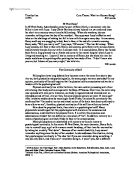I will argue the empathic access theory by presenting the shortcomings of other psychological continuity theories of personal identity, and showing how empathic access can overcome these.
Topic 4: Empathic Access
Introduction
In this paper I will discuss a certain view of personal identity: empathic access. In particular, I will introduce empathic access and describe its nature and criteria. I will then consider the view in detail, examining the strongest arguments for, the strongest objections to and the responses to these objections. I will end by summarising the defence for empathic access this paper has crafted.
View
The empathic access theory is the view that in order to preserve an identity, one must have empathic access to the states of their former self. Empathic access refers to a compassionate connection to the past, one that is not just memories, but that holds a fundamental sympathy for the remembered states. Accordingly, it is more than just recollection, but essentially requires one’s former psychological make-up to be used for future decisions (Schechtman, 2001, p. 102). Considering people experience change in their values, and characteristics over time, it is necessary for psychological identity defining theories to measure the extent to which change is identity destroying. The empathic access theory is not a theory designed to solely define personal identity, but rather an attempt to strengthen the psychological continuity theory by clarifying identity-preserving and identity-destroying change. Essentially the empathic access theory considers one to have maintained their identity where they can remember their past states and have sympathy and understanding for these states.
Strongest Arguments for
I will argue the empathic access theory by presenting the shortcomings of other psychological continuity theories of personal identity, and showing how empathic access can overcome these.
Psychological continuity
The psychological continuity theory requires someone’s psychological state to remain constant throughout their lifetime in order to preserve their personal identity. The observable has not been considered: people experience a change in their beliefs, desires, character traits and values throughout a lifetime, without being perceived to have undergone a change of identity. Thus, there must be something that distinguishes between personal development and identity-destroying psychological discontinuity. Some theorists suggest that it is the abruptness at which change occurs. When changes are violent and radical, they seem to disrupt an identity, while gradual changes are likely to be seen as personal development. If we consider Schechtman’s example of two matrons (Schechtman, 2001, p. 101), however, we will see that identity change can happen slowly, as well as quickly. A ‘serious’ matron remembers her wild party days, but over time she has withdrawn herself from her past desires and does not understand why she once did as she did: “she, herself, is so alienated from those desires and passions that she cannot quite comprehend how she could have made those choices” (Schechtman, 2001, p. 101). A ‘less-serious’ matron also remembers her party girl days, but she has chosen not to withdraw herself from them and, in fact, has decided to use her past lessons in future decision-making: “[she] has not lost access to her past phenomenology; she has only placed it in a broader context which causes her to make different life choices.” (Schechtman, 2001, p. 101)








